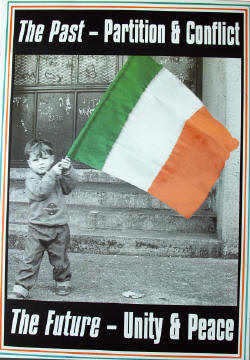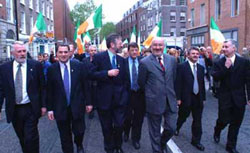 |
Irisch
Republikanische Solidarität
|
 |
NO ANSWERS IN BARRON REPORT
A report report by former Irish Supreme Court judge Mr Justice
Henry Barron on the 1974 Dublin-Monaghan bombings has raised
more questions than it has answered.
Distributed to journalists this evening in print form, the
report criticises the Dublin government of the day for their
handling of the killings.
Three car bombs killed 26 people and injured hundreds more
during rush-hour in Dublin on May 17 1974. An hour later a
stolen car exploded outside a pub in the border town of
Monaghan, killing seven people.
The long-delayed report is highly critical of the
investigation into the bombings by the 26-County Garda police.
Justice Barron's report found some evidence of collusion
between members of the RUC police and unionist paramilitaries,
but would not infer that the collusion involved the higher
levels of the British government of the time.
The judge, operating with minimal powers of investigation in
the South and frequently rebuffed by the British authorities
in the North, largely failed to add to existing information
uncovered by media investigations.
Earlier this year, the Irish Prime Minister, Taoiseach Bertie
Ahern, admitted that it would be "over-optimistic" to say that
the judge had received all the information he wanted.
'LITTLE INTEREST'
In his conclusions, Judge Barron writes that the Irish
government of the day "failed to show the concern expected of
it" in relation to the bombings.
"The Government of the day showed little interest in the
bombings," he said.
"When information was given to them suggesting that the
British authorities had intelligence naming the bombers, this
was not followed up. Any follow-up was limited to complaints
by the Minister for Foreign Affairs that those involved had
been released from internment."
But it appeared that there had been no input from Liam
Cosgrave, the then Taoiseach, or his former Justice Minister,
Mr Cooney.
The report was also critical of the Garda investigation into
the bombings saying it "failed to make full use of the
information it obtained".
On the issue of collusion between the bombers and the North's
security forces, the report said: "The involvement of
individual members in such an activity does not in itself mean
the bombings were either officially or unofficially
state-sanctioned".
"If one accepts that some people were involved, they may well
have been acting on their own initiative. Ultimately, a
finding that there was collusion between the perpetrators and
the authorities in Northern Ireland is a matter of inference.
"On some occasions an inference is irresistible or can be
drawn as a matter of probability. Here, it is the view of the
inquiry that this inference is not sufficiently strong. It
does not follow even as a matter of probability. Unless
further information comes to hand, such involvement must
remain a suspicion. It is not proven."
Barron's imprecise conclusions, and his legalistic expression
angered some of the relatives, who walked out of the press
conference at which his report was first presented to the
families and the media this evening.
Mr Des Doherty, solicitor for the family of Edward O'Neill and
John O'Brien said there was nothing new in the report that the
families had not previously known. "It's obscene," he said.
"The report has been a complete and utter waste of time and
expense and my clients are severely disappointed."
He dismissed the report as "a re-hash of what is already in
the public domain".
"What we need is the co-operation of both governments because
a report from one side of the equation is no good," said Des
Docherty.
"What we need is for the situation to move forward and that
means to move forward in terms of truth and state
accountability, that is the key."
Michelle O'Brien, whose mother was one of those killed, has
said she will fight on.
"I have been at this since the 17th anniversary and I have no
intentions of walking away.
"I want to know why my mother was killed in cold blood on the
streets of Dublin when she went shopping.
"She was 35 years of age with two children, she went shopping
and never came home and I want to know the answer.
The O'Brien and O'Neill families are not with the larger
'Justice for the Forgotten' group, which has not yet given its
reaction to the report.
COMMITTEE DAYS
Responding to the report, Mr Ahern described the incidents as
"unspeakable outrages and despicable and cowardly acts of
inhumanity."
But he resisted demands to call an immediate public inquiry,
insteading passing the report to a parliamentary committee --
a step widely seen as a further delay in the process.
He said the parliamentary Committee on Justice would now
study the Barron findings and report back within three months
ahead of any decision being taken about a public inquiry.
The chairman of the committee indicated this evening that the
former Taoiseach Liam Cosgrave, would be "invited" to make a
submission to the committee during its hearings early in the
New Year.
Sinn Fein's Mr Caoimhghin O Caolain said the Barron report was
an indictment of successive Irish and British governments.
He claimed: "The publication of the report is firstly a
tribute to the dedication of the survivors and the bereaved of
the Dublin and Monaghan bombings.
"But for their persistence there would never have been such an
investigation and the victims would indeed have been largely
forgotten by Irish society.
"For almost 30 years the victims and their families have been
seeking truth and justice. Our sympathy and solidarity is with
them on this day as they relive the terrible events of May
17th 1974."
He stressed that the British had thwarted any proper
investigation of the bombings. "They failed to co-operate
properly with Judge Barron," he said.
"Equally serious is the Report's scathing criticism of the
role of the authorities in this State. The Garda investigation
was totally inadequate and was compromised by the close links
between the gardai and elements of British intelligence,
including British agents within the gardai.
"Successive governments were content to preside over a
conspiracy of silence on all of this. It is appalling that
when evidence was shown to the Irish Government that the
British knew the identity of the bombers they showed little
interest."
Labour's Joe Costello said the principal conclusion to be
drawn was that the victims and survivors of the bombings were
very badly let down by the institutions of the state.
He added: "What is very clear is that the Garda investigation
into what was the greatest mass murder in the history of the
state was totally inadequate and that there did not appear to
have been any real determination on the part of the
authorities to see those responsible brought to justice.
"Even allowing for the very difficult conditions in which the
Gardai were operating at the time, the account of the
investigation is a sorry chapter of shortcomings and failure.
"The conclusion of the report that it is likely that there was
collusion between those responsible for the bombing and
members of the RUC and UDR is truly shocking, if not
altogether surprising in view of the evidence suggesting this
produced by the media over the years."
Letzte Änderung:
14-Dez-03